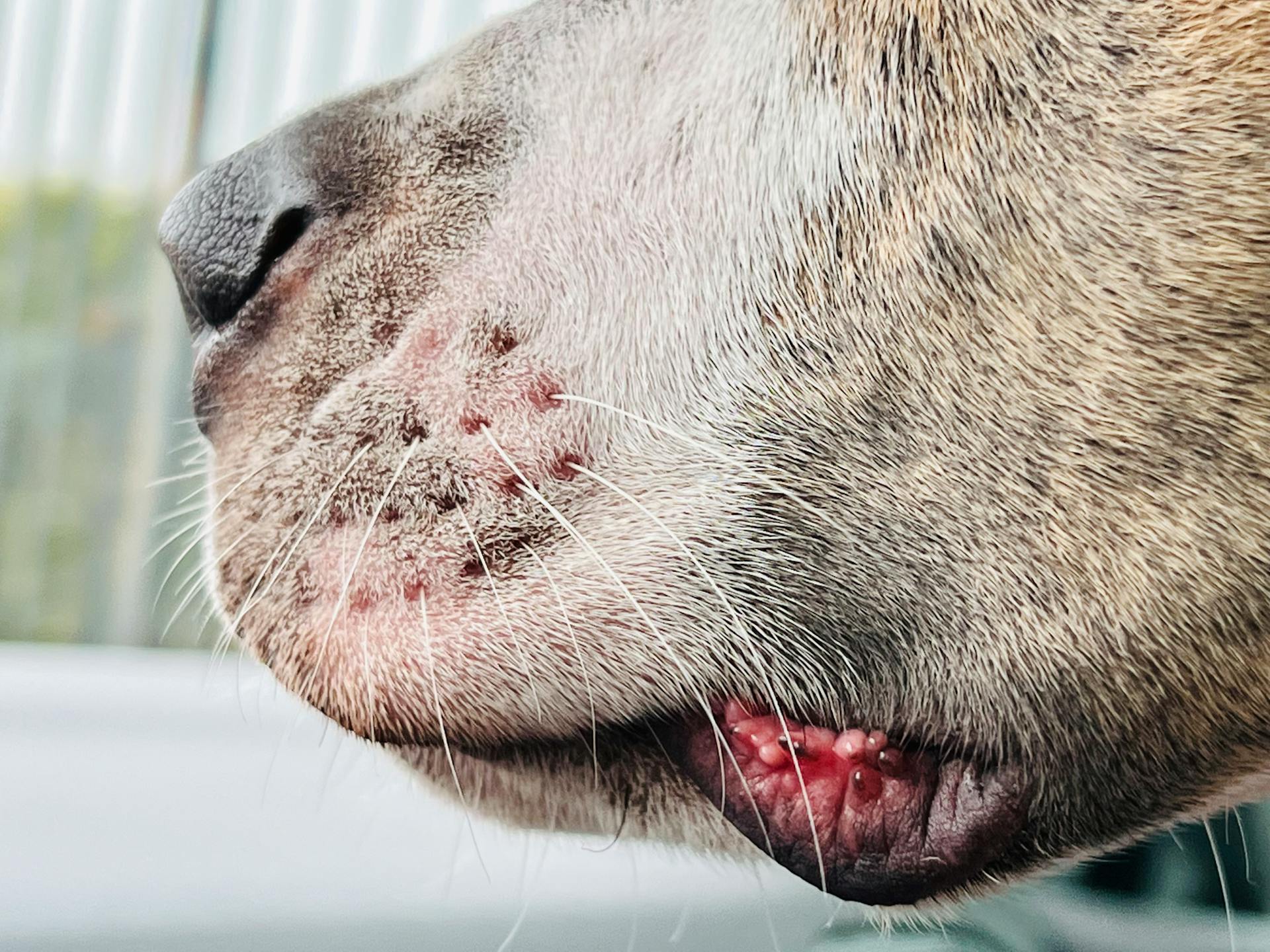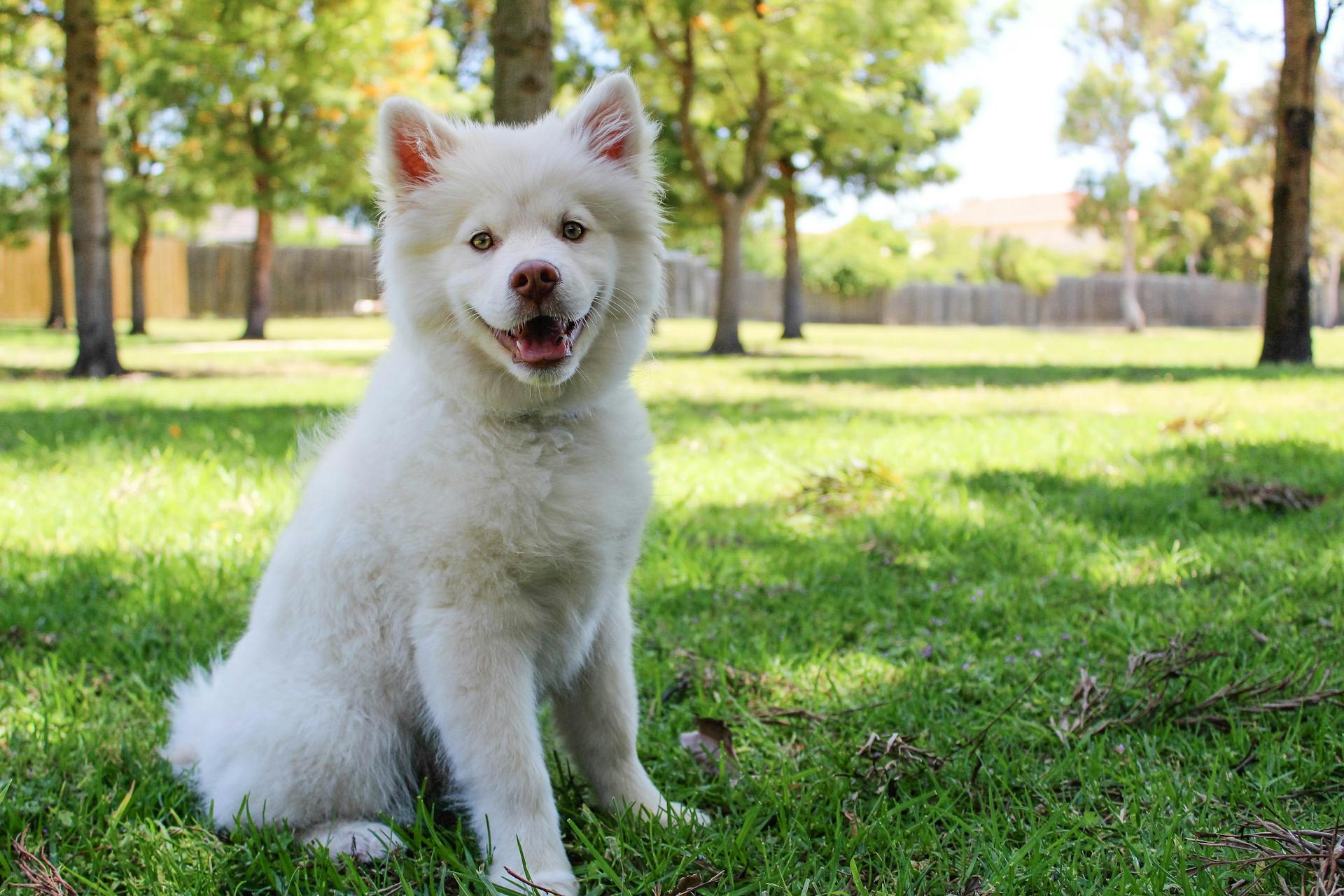
Dog skin odor can be a real nuisance, both for our furry friends and for us. According to research, the primary cause of dog skin odor is an overgrowth of bacteria and yeast on the skin.
Some breeds, such as Bulldogs and Pugs, are more prone to skin odor due to their brachycephalic skull structure, which can lead to skin folds and moisture buildup.
Regular bathing is essential in controlling dog skin odor, but over-bathing can strip the skin of its natural oils, exacerbating the problem. The ideal bathing frequency varies depending on the dog's age, health, and lifestyle.
A balanced diet rich in omega-3 fatty acids can help reduce inflammation and promote healthy skin, which in turn can minimize skin odor.
A unique perspective: Bathing Dogs with Allergies
Causes of Dog Skin Odor
Dogs can develop skin odor due to various reasons. Skin disease is a common cause, which can be triggered by allergies, hormonal imbalances, fungal infections, external parasites, inflammation, wounds, bleeding tumors, and other skin issues.
Fungal infections, such as Malassezia yeast, and bacterial infections, like staphylococcus pseudintermedius, can overgrow on a dog's skin, causing skin issues and odors. These infections often begin with dog allergies that lead to scratching and licking behaviors, which can open the door for infections.
Signs of discomfort, such as itchy behaviors like head shaking, licking, or rubbing against furniture, people, or walls, can indicate skin issues. Changes in skin and coat, including skin color changes, hair loss, or spots of shorter coat, may also be present.
A progression of the smell, with an increase in odor intensity, is a meaningful indicator of a skin issue. Crust and color changes, such as redness or crusting, in the affected area can also be a sign of an underlying infection.
Here are some common causes of dog skin odor, as identified by veterinarians:
- Skin infections (e.g., bacterial or yeast infections)
- Ear infections (otitis externa)
- Dental problems (e.g., periodontal disease or infected teeth)
- Anal gland problems
If you notice a persistent or unusual smell on your dog, it's essential to consult with a vet to rule out underlying health problems and treat any symptoms.
Preventing and Removing Odors
Regular gentle baths are the best way to prevent bad smells in dogs, but don't over-bathe as it can dry out the skin. Ask your vet about the appropriate timing of baths and the best products to use.
Most healthy dogs do well with monthly baths using pet-specific, soap-free shampoos, but each dog has individual needs. Keeping up with recommended wellness vet visits is another way to prevent odors.
Your vet may be able to detect changes that might lead to odors and treat them before they even become an issue. For example, regular dental care can help prevent bad breath and other oral-related odors.
A simple bath can undo damage from rolling in smelly things, which is a common cause of stinky dogs. To keep your home smelling fresh, consider using pet-specific, soap-free shampoos for regular baths.
Here are some tips for preventing and removing odors:
- Regular gentle baths (monthly for most healthy dogs)
- Pet-specific, soap-free shampoos
- Recommended wellness vet visits
- Regular dental care
Ear and Skin Health
Regular ear cleanings can be a challenge, but it's essential to keep your dog's ears clean and dry to prevent odors associated with ear infections and other ear problems.
Not all dogs need routine ear cleanings, so it's best to check with your vet if you're not sure. Remember, unnecessarily cleaning can actually cause problems for your pup.
Regular grooming, dental care, and routine veterinary checkups are essential in maintaining a dog's overall well-being and minimizing odors.
Discover more: Dog Ear Infection Odor
Ear Health
Ear Health is crucial for your dog's overall well-being. Regularly checking your dog's ears can help prevent ear infections and other ear problems.
Keep an eye on your dog's ears, especially if you notice any unusual odors or debris. Simple ear debris usually doesn't have a strong smell, but infected ears can be a different story.
Ear infections are common in dogs and can contain yeast and/or bacteria, making them malodorous. If you notice your dog scratching at their ears or see unusual debris, it's time to contact your veterinarian.
Regular grooming, dental care, and routine veterinary checkups can help maintain your dog's overall health and minimize odors.
For another approach, see: Skin Relief for Dogs with Allergies
Skin Disease
Skin disease in dogs can cause a range of problems, including infection, irritation, and abnormal oil production.
Allergies and hormonal imbalances are potential causes of skin disease in dogs.
Fungal infections, external parasites, and inflammation can also lead to skin disease.
Your veterinarian can perform tests on the skin and sometimes blood tests to identify the type of infection or underlying cause.
For more insights, see: Can Prong Collars Cause Tracheal Collapse
Medicated shampoos, antibiotics, and other treatments are usually required to combat skin disease.
Bacteria and yeast on the skin's surface can produce foul odors if left untreated.
Skin disease can be a sign of an underlying infection or bodily issue that needs attention.
Your veterinarian can help you identify and address the root cause of your dog's skin disease.
Discover more: Treat Black Skin Disease
Dental Issues & Bad Breath
Dogs smell because of dental issues, and giving them chew toys can help.
Chewing is a dog's natural teeth cleaner, removing plaque and keeping their teeth healthy.
Regular chew toys can make a big difference in a dog's breath.
You can also try dental hygiene dog treats to help keep their teeth clean.
If your dog's breath is unbearably bad, don't hesitate to contact your vet for further advice.
See what others are reading: Dog Breath Fishy Odor
Skunk Spray and Stinky Odors
If your dog has been sprayed by a skunk, it will need a special bath to get rid of the smell. This distinct smell only comes from one source, so you know exactly what you're dealing with.
A unique perspective: How to Get Rid of Fishy Smell from Female Dog
A simple bath is usually enough to undo the damage if your dog has been rolling in something stinky outside. Dogs love to roll around in smelly things, which results in a stinky dog.
Dr. Murdoch suggests trying a few tips to eliminate smelly odors on your dog, and a special bath is one of them. To eliminate smelly odors on your dog, try these tips from Dr. Murdoch.
You might enjoy: Dog Health Tips
Maintaining Cleanliness
Maintaining Cleanliness is key to keeping your dog smelling fresh.
Bathe your dog regularly to prevent skin odor from building up. This means washing them at least once a week, or more often if they get dirty or stinky.
Choose a dog-friendly shampoo that suits your pet's skin type and condition, and make sure to thoroughly wash your dog to remove all traces of shampoo. If not fully rinsed out, shampoo can contribute to lingering smells.
If your dog is a wrinkly breed, like Bulldogs and French Bulldogs, Shar-Peis and Pugs, give their skin folds extra attention during bath time. These areas can trap dirt and moisture, leading to unpleasant odors.
To dry your dog quickly and efficiently, use a lot of towels. This will help prevent moisture from getting trapped in their coat, reducing the likelihood of skin odor.
By following these simple tips, you can help keep your dog smelling fresh and clean.
When to Go to the Vet
If your dog's odor persists even with regular grooming, it may indicate a potential health issue.
A foul odor can be a sign of a skin infection, dental problems, or anal gland issues.
Changes in your dog's appetite or behavior warrant a visit to the vet.
A visit to the vet is also necessary if you notice any changes in your dog's skin condition.
Regular vet wellness checkups can help catch potential issues early on.
Dr. Murdoch recommends scheduling regular vet wellness checkups to address potential issues before they become serious.
Effective Shampoos and Treatments
Choosing the right shampoo is key to reducing dog odor. Look for products that use natural ingredients like oatmeal and aloe vera to moisturize your dog's fur and soothe their skin.
It's essential to choose a shampoo suitable for your dog's specific needs, such as addressing skin conditions or allergies. Consulting with a vet for personalized recommendations is always a good practice.
Treatment for dog odor caused by physical issues may require veterinary intervention. Regular or medicated baths might help, and in some cases, surgery may be necessary to remove the source of the smell.
Additional reading: Diy Dog Shampoo for Odor
The Best Shampoo

There are plenty of shampoos on the market that can help minimize dog odor.
Dr. Murdoch recommends looking for products that use natural ingredients like oatmeal and aloe vera to moisturize your dog's fur and soothe their skin.
Choosing a shampoo suitable for your dog's specific needs is essential, whether it's addressing skin conditions or allergies.
Consulting with a vet for personalized recommendations is always a good practice.
Treatment for
Treatment for your dog's odor can be a straightforward process. Depending on the cause of the smell, regular or medicated baths might help.
If your vet discovers a physical issue, veterinary treatment may be necessary. In some cases, surgery may be necessary to remove the source of the smell.
Your veterinarian may prescribe antibiotics, antifungals, or other medications if there is an infection present. This can help eliminate the underlying cause of the odor.
You might like: Do Beagle Dogs Smell
Frequently Asked Questions
What does an infection smell like on a dog?
An infection on a dog typically smells putrid or foul, often described as a strong, unpleasant odor that's cause for concern. If you notice a strong, unpleasant smell coming from your dog, it's essential to seek veterinary attention to rule out potential infections.
Sources
- https://www.akc.org/expert-advice/health/why-does-my-dog-smell/
- https://be.chewy.com/the-dog-odor-answer/
- https://www.thesprucepets.com/my-dog-still-stink-after-bath-3384915
- https://www.puroclean.com/blog/whats-that-odor-how-to-get-rid-of-dog-smell-in-your-home/
- https://angryorange.com/blogs/news/why-does-my-dog-smell-so-bad
Featured Images: pexels.com


